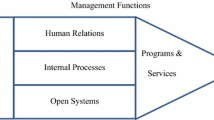Abstract
Consumer-run organizations (CROs) are self-help oriented organizations that are run entirely by consumers (people who use or have used mental health services). The current study utilizes an organizational capacity framework to explore the needs of operating CROs. This framework includes four core capacity areas: (1) technical, (2) management, (3) leadership, and (4) adaptive capacity. An analysis reveals that the greatest organizational needs are related to technical and management capacities. Implications are discussed in terms of strategies and activities that CRO leaders and mental health professionals and administrators can use to strengthen the organizational capacity of CROs in their community.
Similar content being viewed by others
References
Brown, L. D., Shepherd, M. D., Wituk, S. A., & Meissen, G. J. (in press). How settings change people: Applying behavior setting theory to consumer-run mutual support organizations. Journal of Community Psychology.
Chinman, M., Kloos, B., O’ Connell, M., & Davidson, L. (2002). Service providers’ views of psychiatric mutual support groups. Journal of Community Psychology, 30, 349–366.
Connolly, P. M., & York, P. J. (2002). Evaluating capacity-building efforts for nonprofit organizations. OD Practitioner, 34, 33–39.
Goldstrom, I. D., Campbell, J., Rogers, J. A., Lambert, D. B., Blacklow, B., Henderson, M. J. & Manderscheid, R. W. (2004). Mental health consumer organizations: A national picture. In R. W. Mandersheid, & J. T. Berry (Eds.), Mental health, United States, 2004 (pp. 247–255). DHHS Pub no. (SMA)-06-4195. Rockville: Substance Abuse and Mental Health Services Administration, 2006.
Goldstrom, I. D., Campbell, J., Rogers, J. A., Lambert, D. B., Blacklow, B., Henderson, M. J., & Manderscheid, R. W. (2006). National estimates for mental health mutual support groups, self-help organizations, and consumer-operated services. Administration and Policy in Mental Health and Mental Health Services Research, 33, 92–103.
Hodges, J. Q., & Hardiman, E. R. (2006). Promoting healthy organizational partnerships and collaboration between consumer-run and community mental health agencies. Administration and Policy in Mental Health and Mental Health Services Research, 33(3), 267–278.
Kessler, R. C., Mickelson, K. D., & Zhao, S. (1997). Patterns and correlates of self-help group membership in the United States. Social Policy, 27(3), 27–26.
Lawson, H. A. (2004). The logic of collaboration in education and the human services. The Journal of Interprofessional Care, 18(3), 225–237.
Mowbray, C. T., Robinson, E. A., & Holter, M. C. (2002). Consumer drop-in centers: Operations, services, and consumer involvement. Health and Social Work, 27, 248–261.
Nelson, G., Lord, J., & Ochocka, J. (2001). Shifting the paradigm in community mental health: Towards empowerment and community. Toronto: University of Toronto Press.
New Freedom Commission on Mental Health (2003). Achieving the promise: Transforming mental health care in America: Final report. DHHS Pub. No. SMA-03-3832. Rockville: U.S. Department of Health and Human Services.
Norcross, J. C. (2000). Here comes the self-help revolution in mental health. Psychotherapy, 37(4), 370–277.
Riessman, F., & Carroll, D. (1995). Redefining Self-Help. San Francisco: Jossey-Bass.
Segal, S. P., & Silverman, C. (2002). Determinants of client outcomes in self-help agencies. Psychiatric Services, 53, 304–309.
Smith, D. H. (2000). Grassroots Associations. Thousand Oaks: Sage.
Trainor, J., Shepherd, M., Boydell, K. M., Leff, A., & Crawford, E. (1997). Beyond the service paradigm: The impact and implications of consumer/survivor initiatives. Psychiatric Rehabilitation Journal, 21, 132–140.
Van Tosh, L., & del Vecchio, P. (2000). Consumer-operated self-help programs: A technical report (pp. 1–94). Rockville: U.S. Center for Mental Health Services.
Author information
Authors and Affiliations
Corresponding author
Rights and permissions
About this article
Cite this article
Wituk, S., Vu, C.C., Brown, L.D. et al. Organizational Capacity Needs of Consumer-Run Organizations. Adm Policy Ment Health 35, 212–219 (2008). https://doi.org/10.1007/s10488-007-0162-7
Received:
Accepted:
Published:
Issue Date:
DOI: https://doi.org/10.1007/s10488-007-0162-7




